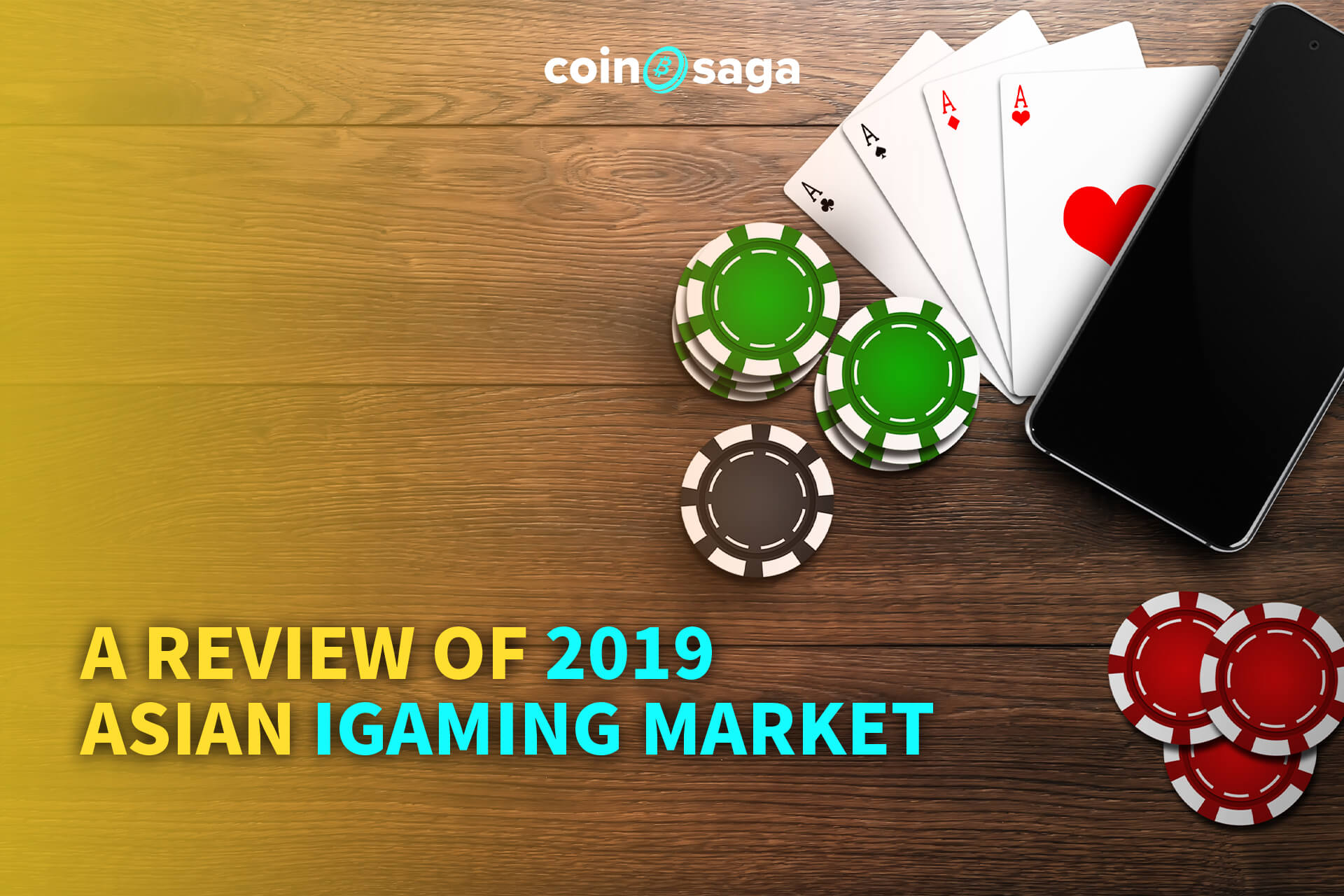In 2018, the iGaming industry developed rapidly. The constant technological change and continuous innovation empowered the iGaming industry to continue to subdivide and enter niche markets.
In 2019, the Asian iGaming industry consisted of two propositions “technology” and “innovation”.
Blockchain technology has brought many opportunities and new perspectives to the iGaming industry. iGaming operators actively used blockchain technology in online-betting applications to provide users with payment services for Bitcoin and other cryptocurrencies. By using Bitcoin and other digital currencies to pay, players can be completely anonymous. Currently, Bitcoin has been used in sports betting, poker, lotteries, and roulette games.
AI technology is gradually being introduced in various industries to improve business processes. iGaming operators have integrated AI technology into their online iGaming applications to improve the user experience. Casino operators have begun to use AI technology to analyze users’ risk appetite, find the most profitable players, and predict winners and losers during casino games.
From 2018-2022, the global online gambling market will grow at an annual growth rate of 11%, resulting in incremental growth of more than US $35 billion. Behind this growth, 44% will be contributed by the Asia-Pacific region. The explosive growth of mobile device users is one of the key factors behind the unprecedented growth in the region. With the increasing popularity of cryptocurrencies, many online iGaming operators are using Bitcoin and altcoins as a currency to solve the payment issue.
The popularity of the Internet and the population demographic mean that online iGaming in Asia will continue to explode in the coming years. However, there are many problems lurking in the Asian market. First, compliance needs to be urgently addressed. In 2019, China continued to exert pressure on Southeast Asian iGaming regulators to stop issuing offshore iGaming licenses to Chinese iGaming operators. In addition, Asian iGaming companies were actively adjusting their brand strategies. The top players in the industry are leading the way through mergers and acquisitions in the data industry, smart marketing industry, and artificial intelligence industry, all in an effort to build an industry chain with technology and innovation at its core.
- Policy
In 2019, China’s continued to tighten policy. The review conditions of game providers became significantly stricter. The growth of mobile games bottomed out and competition continued to intensify. At the same time, the upstream and downstream of the game industry faced huge policy impacts.
1.1 The distribution of game licenses plunged
The stricter rules and controls on game licenses had a big influence on “chess and poker” games, with a huge reduction in the number of chess and poker games, falling from around a third to less than 2%. Before the tightened policy: chess and poker, puzzle (including elimination), APRG, and MMO were the types of mobile games with the largest number of reviews. Chess and poker category accounted for 30% -40%.
1.2 Payment policy tightened
Since the official implementation of China`s “break connection” policy in 2018, the payment industry has been hit hard. And for the iGaming industry, the payment issue is critical. In 2019, China introduced a series of policies on payment compliance to:
- Realize a centralized deposit reserve of 100%.
- Change the naming system to a “real person system”, strictly control suspicious transactions, and ensure transfer information is clear.
- Strictly monitor the authenticity of aggregate payment merchants.
The number of canceled payment licenses increased to 33. Existing payment companies will face the risk of not having their licenses renewed, directly reducing the choice of payment companies.
1.3 iGaming licenses
In 2019, the issuance of the most important iGaming licenses in the Philippines and Cambodia was suspended. However, Macau maintained it’s six players, two of whom were granted a two-year extension.
The Philippines, which was the first country in Asia to license iGaming, has the second-largest iGaming industry in Asia after Macau, but its online iGaming industry ranks first in Asia. The announcement of a series of license policies in 2019 will undoubtedly hit companies that already have iGaming operations in the Philippines hard.
Cambodia’s Westport city became the third-largest city in Southeast Asia’s iGaming industry. According to statistics, Cambodia has issued 200 iGaming licenses and another 30 iGaming licenses are awaiting approval. The number of licenses is much larger than that of the Philippines. But unlike the Philippines, in addition to online iGaming, it has a large number of land casinos.
In the short term, not adding new online gambling licenses will not have a major impact on the entire industry, as many operators still have valid licenses for more than 10-20 years. In the long run, this will have a profound impact on the Asian iGaming industry.
2. Technology
In 2019, R & D companies, big data companies, and streaming companies in the iGaming field in the European and American markets all begun to try to use blockchain, artificial intelligence, big data, and other technologies. In addition, these changes indicate that there may no longer be a need for live dealers in the iGaming industry in the future, and that AI could replace manpower to save more costs.
2.1 Blockchain
In 2019, the global iGaming industry’s revenue was $138 billion USD. Returning to the blockchain, the three major platforms of Ethereum, TRON, and EOS processed a total of $5 billion worth of transactions. The proportion of the game market is still relatively small. Although anonymous and transparent, decentralized blockchain technology seems to be able to solve many headaches for iGaming players and operators, but there is still a long way to go for acceptance by B-end and C-end users.
Judging from the data disclosed by the decentralized application website DApp.com, the main implications of blockchain applications in the first three quarters of 2019 were on the number of active users and quantity of transactions.
2.2 VR / AR technology
The iGaming industry’s research on VR and AR technology has never stopped. At the thirteenth Asian International Entertainment Exhibition held in Macau in May 2019, the VR element slot machine was debuted. NetEnt, an online iGaming development giant, has also launched an online slot game with VR elements.
All in all, in 2019, there has not been a company that can fully integrate VR and iGaming, and actually make commercial use of it. The exploration concept of VR in the industry is far greater than practical, and we expect that the actual application scenarios of VR will come in early 2020.
2.3 AI
There are many potential applications for artificial intelligence in the field of sports betting:
- To target different bettors and sports fans.
- Improve player participation to increase company revenues.
- Grasp the player’s preferences and interests, and promote players to participate more.
- Help players to make betting decisions by pushing key game data.
- Generate betting recommendations based on a player’s historical betting records.
The impact of artificial intelligence on iGaming companies is:
- iGaming companies can better understand the market and attract more players.
- Understand the specific characteristics of iGaming players.
- Reduce the operating costs of bookmakers.
3. Payment
Payment is a key part of the iGaming industry, and it continuously delivers “customers” and funds to online iGaming platforms. Throughout 2019, the online payment channels used by the iGaming industry have come under increasing pressure from the Chinese authorities. As a result, costs have continued to rise, the number of payment channels has decreased, and the payment methods have become more secretive and diverse.
3.1 Payment Status
Payment Cost
From about 2% to 3%, but sometimes more than 4-5%.
Online channels
The use of traditional bank card transfers, third-party payment providers, aggregate payments*, and cryptocurrencies are all being constantly explored by iGaming providers. Coinsaga Cryptocurrency Casino allows Bitcoin payments, which shows the industry’s continuous attempts to find suitable and diverse payment methods for consumers that are also permitted by authorities.
*Aggregated payment (fourth party payment)
When third-party payment risk control is stricter, aggregate payments become the next logical option.
4. User Acquisition and Promotion
Each iGame category has its corresponding segmented user portraits. Successful iGaming companies can often accurately obtain user portraits and customize targeted game experiences for different types of players. In the Internet age where information is exploding, the preferences of different users are different and difficult to figure out.
New innovative games are likely to subvert traditional iGaming games and new business models will ultimately emerge. New start-ups continue to challenge the status of traditional iGaming companies with their technological advantages. Under increasingly fierce industry competition, iGaming companies need to seriously consider how to consolidate users’ brand loyalty, and acquire more accurate data for potential users.
4.1 Users Acquisition
The search engine is the number one traffic entry for Internet users. As the largest search engine in China, Baidu can intuitively reflect the online behavior of Chinese netizens. Therefore, the Coinsaga team conducted a survey on the search behavior of iGaming users specifically for the Baidu search engine.
The search index reflects the overall search index performance for the selected time period for the keywords below, and reflects the user’s attention to the words and the search interest. In order to more intuitively reflect the popularity, we specifically selected the search index of the popular Chinese mobile game “Arena Of Valor” as a reference.
Keyword search index comparison
| Keyword | Overall daily | Mobile daily | YoY | Mobile YOY |
| Arena Of Valor | 101,102 | 85,102 | 44% | 37% |
| Baccarat | 2,866 | 2,507 | 23% | 18% |
| Chess & poker games | 10,356 | 10,198 | 481% | 643% |
| Fishing | 3,600 | 3,484 | 39% | 45% |
| Sports Betting | 12,308 | 11,205 | 32% | 32% |
Time period: January 1, 2019-December 31, 2019
Search index ranking by region
Among them, the search index of “Baccarat” in the Guangdong Province is much higher than that of several other provinces, and it is well-known in all kinds of iGaming hot words. We found that in the hot word search results related to iGaming, the locality is very obvious.
Let’s take a look at the phenomenon reflected by the users searching for keywords such as “Baccarat”, “Fishing Game”, “Sports Lottery” and “Chess & Poker Game” based on age. We can see that the age groups of search engine users is mainly distributed in the 20-39 age group, which is consistent with the demographic characteristics of Internet users.
In addition, from the perspective of TGI* (target group index), you will find more interesting phenomena regarding product attributes. The search population for “chess and poker games” and “sports lottery” reflects the characteristics of a more elderly age group. While “Baccarat” and “Fishing Game” reflect the attributes of young and middle-aged people aged 20-39.
- The TGI target group index can reflect the strength or weakness of the target group within a specific research area (such as geographic area, demographic, media audience, product consumer).
From the comparison of gender distribution, another interesting phenomenon is that the search users of “chess and poker games” are actually equally divided between men and women. Judging from this result, will product managers still consider using sexual beauty images as elements of promotional posters?
Judging from the TGI target group index of hobbies and interests, search users of “Baccarat” and “Sports Lottery” companies may pay more attention to the fields of automobiles and finance. In contrast, the search users of “Chess and poker Games” do not have a particularly prominent interest tendency, and as such, have the lowest interest in in-game products in several sets of data.
Asia also experienced relatively strong growth in 2019 in the number of iGaming players. We conducted a sample survey on December user data for online iGaming platforms in Asia. The number of newly registered users had doubled compared to December 2018.
iGaming players in Asia mainly come from the following countries:
- China
- Japan
- Thailand
- Cambodia • Myanmar
Chinese players mostly come from the following regions:
- Guangdong
- Shanghai
- Chongqing
- Hunan
- Sichuan
The most popular game categories in Asia:
Live video category: Baccarat
Video games: Slot machine games with Chinese cultural elements
Arcade games: Birds, beasts, forest, prom type games
Devices: 80% are mobile devices, 65% are android devices
4.2 Promote
With the campaign of China’s 2019 Internet Cleansing, promotional channels in China have gradually become rarer and more hidden. Nowadays, the difficulty of obtaining traffic has increased, and false traffic has increased the cost of customer acquisition. At this time, the two directions of development gradually became clearer:
- Technical traffic.
- Self-built traffic pool.
Definition of technical introduction: through technical means, accurately obtain the promotional target from the external traffic, and send the promotion information to a fixed point.
Technical drainage keywords: group control, hacking, hijacking self-built traffic pool. Definition: As the name implies, it attracts target users for deep cultivation through products or content.
Main methods: self-built KOL / self-built APP / self-built porn site, resource station / self-built novel station, etc. The advantages are: you can control the accuracy of the flow, and no longer be deceived by false traffic. In addition, they can better service their own products. Soft ads and hard ads can be added anytime, anywhere, and in different ways.
5. Blockchain & Lottery Games of the Year – Just.game
Although the sales volume of China`s lottery market in 2019 has decreased significantly year-on-year, the forms of Internet lottery play are growing. In particular, lottery-type games that are based on the blockchain have always received a lot of attention and have been successful.
In July 2019, Just.game, created by the original team of Fomo3D, launched online for 3 hours, with a total transaction amount of up to $5.7 million. Just.game transferred the entire ecosystem from Ethereum (ETH) to TRON (TRX), When Justin Son’s support for Just.game received a lot of exposure.
This time, Just.game transformed the original purchase “key” into a popular out-of-the-box game, which enhanced the sense of the game and weakened the sense of investment; and the game introduced a player exit mechanism. Players who open the box before the game ends can still get 2 times the obtained value of dividends. This lowered the threshold for latecomers to participate and the risk of player input. Both of these were optimized from Fomo3D. The easy-to-enter/exit mechanism made crypto fans rush to play.
Introduction to gameplay: Players can spend 25 TRX to buy a box, and each box can enjoy the dividends of the person who bought the box afterwards. The dividends can be accumulated without limit. When you actively open the box, you can get 2 times the dividend. Both opening the box and buying the box will last 30 seconds. After the game ends, the last 100 players who bought the box will share a prize pool.
Just.game is essentially similar to Fomo3D, but there are also obvious differences.
Similarities:
l. At the beginning, all who participated in the game bought virtual items (Key / Box). The token represents the dividend rights. The former participants will get dividends from the latter participants.
2. It is through the continuous temptation to participate that it invests the possibility of winning funds to extend the game time and report to token holders.
3. All through smart contracts to ensure that the game content cannot be tampered with.
Differences:
| FOMO3D | JUST.GAME |
| The price of a Key keeps increasing with the inflow of funds | The price of the box remains the same, the box can be opened |
| The last person claims the grand prize | The last 100 people share the jackpot |
| On the Ethereum public chain | On the TRON public chain |
Outlook 2020
According to Statista data, the online iGaming industry is expected to grow from a market value of $45.8 billion in 2017 to a market of $94.4 billion in 2024. Although these numbers may seem radical, through in-depth research and insights in the industry, we have found that online gambling, especially in the US and Asia-Pacific still has a lot of room for development. For example, the introduction of legal sports betting in the United States, and so on. These countries and regions are expected to create their own online iGaming prosperity miracle.
Although online casinos seem to be the leader in the iGaming industry, in fact, online sports betting has far exceeded the global online casino betting volume. All of this is due to the continuous development of mobile technology, as more and more bettors register and play on their smartphones. The Asian sports betting market still has huge room for growth.
E-sports, as a sub-category of the iGaming market, has shown a surprising development trend. In the past few years, e-sports has undergone a complete transformation. Since the niche community has become an important competitive industry all in its own right and can now be compared with traditional sports – it has even been officially listed as a sport in China.
Game tournaments such as the League of Legends and Dota attract audiences of millions online and provide millions of dollars in prizes for the winners. Therefore, it is not surprising that e-sports have become a new favorite in iGaming.
AI technology will be used to combat online gambling cheating and create a fairer iGaming environment for all players. In addition, AI technology can provide iGaming companies with intelligent customer services, support product and technology optimization, user analysis, personalized marketing, and many other fields.
Female users and cashless payments further promote online gambling. The growing number of female users in iGaming games and the convenience of cashless payment during iGaming will further promote the online iGaming market





